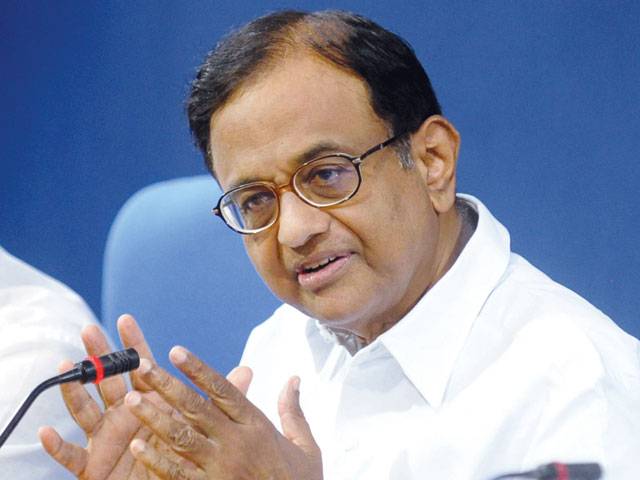NEW DELHI : India’s embattled government said Monday it had lifted tens of millions of people out of poverty as it trumpeted its record in the last budget before elections it is widely tipped to lose.
Finance Minister P. Chidambaram talked up his government’s achievements over the past decade and announced a package of cuts in indirect taxes in the budget for the next financial year starting April 1.
Struggling to be heard above protesting lawmakers, Chidambaram steered clear of a populist spending spree to win over voters, despite the Congress-led govt’s almost certain defeat at the polls due by May. Chidambaram said the fiscal deficit would be contained at 4.6 percent of gross domestic product in the current financial year, beating his own target of 4.8 percent, before shrinking to 4.1 pc in the next. “I can confidently assert that the economy is more stable today than what it was two years ago,” Chidambaram told parliament.
“The fiscal deficit is declining, the current account deficit has been contained, inflation has moderated, the quarterly growth rate is on the rise, the exchange rate is stable.”
“I reject the argument of policy paralysis,” he added.
Chidambaram outlined the budget for the full year even though the new government, to be formed after elections due by May, will draw up its own spending and tax plans.
Asia’s third-largest economy is facing the worst slowdown in a decade, with growth at 4.5 percent last year, along with shrinking manufacturing, poor jobs growth and stubbornly high inflation.
Opinion polls show Congress headed for defeat at the elections, with voters disenchanted by a string of corruption scandals as well as perceived mismanagement of the economy and policy paralysis.
But Chidambaram said the government had successfully steered India through the global economic slowdown. He listed a string of domestic achievements, including helping the poor and raising food production.
“Our greatest achievement is lifting 140 million people out of poverty,” he told lawmakers, some of whom were angrily chanting against plans to create a new state in the southeast.
“Only a handful of countries were able to keep their heads above the water (because of the global slowdown) and India was one of them.”
Chidambaram announced cuts on taxes on cars, cellphones and other goods in an attempt to increase consumer consumption and boost the slumping manufacturing sector, including the ailing auto industry.
Excise duties on SUVs would be slashed from 30 percent to 24 percent and from 12 percent to eight percent for other vehicles and two-wheelers. On some other consumer and capital goods, the tax would be reduced from 12 percent to 10.
Government spending on its enormous food and fuel subsidy to help the millions of poor would increase slightly, he said.
He also unveiled a 10 percent spending increase for the defence sector to raise pensions for retiring personnel, as well as a moratorium on student repayments of soft loans.
The budget envisages total spending of 17.6 trillion rupees ($284 billion) in the next fiscal year, higher than the 15.9 trillion in the current year.
Analysts said the budget was unlikely to stimulate economic growth but the tax changes would create a “feel good factor” and some superficial demand in the economy.
“..Until the government corrects the imbalance between planned and unplanned expenditure, sustainable revival in growth is going to be unlikely,” said Rupa Rege Nitsure, chief economist at the Bank of Baroda.
While cutting spending to reduce the fiscal deficit is a standard procedure worldwide, analysts say it can also hurt growth in a country with widespread poverty and scant infrastructure.
In last year’s February budget, the government raised spending on education, health, agriculture and rural development, even though this did little to bring economic growth back on track.
The 4.5 percent economic expansion last year was far below the near double-digit growth enjoyed in the past decade.
The minister on Monday forecast growth of 4.9 percent in the current financial year which ends March 31.
The Bombay Stock Exchange was up 0.34 percent at 20,435.13 points and the rupee at 61.95 to the dollar compared to 62.05 earlier in the day.
Thursday, April 18, 2024
Indian govt defends record in pre-poll budget

Caption: Indian govt defends record in pre-poll budget
Stefanos Tsitsipas advances in Barcelona
4:19 PM | April 18, 2024
Met Office predicts more rains across country till April 29
2:51 PM | April 18, 2024
Punjab changes school timings for summer season
1:55 PM | April 18, 2024
Enemies of Pakistan are unable to digest investment in the country: Ataullah Tarar
1:29 PM | April 18, 2024
IHC restores Bushra Bibi's appeal for shifting to Adiala Jail from Bani Gala
1:24 PM | April 18, 2024
Hepatitis Challenge
April 18, 2024
IMF Predictions
April 18, 2024
Wheat War
April 18, 2024
Rail Revival
April 17, 2024
Addressing Climate Change
April 17, 2024
Justice denied
April 18, 2024
AI dilemmas unveiled
April 18, 2024
Tax tangle
April 18, 2024
Workforce inequality
April 17, 2024
New partnerships
April 17, 2024
ePaper - Nawaiwaqt
Advertisement
Nawaiwaqt Group | Copyright © 2024





